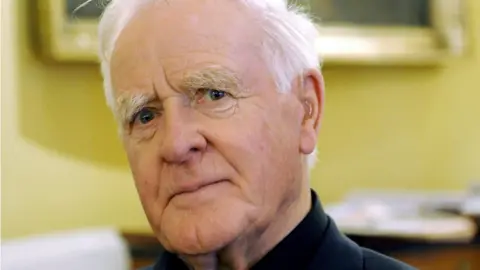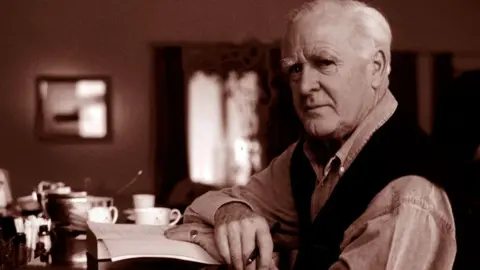John le Carré: Espionage writer dies aged 89
 PA Media
PA MediaBritish espionage writer John le Carré has died aged 89, following a short illness, his literary agent has said.
The author of The Spy Who Came In From The Cold and Tinker, Tailor, Soldier, Spy died from pneumonia on Saturday.
Fellow authors paid tribute, with Stephen King calling him "a literary giant and a humanitarian spirit".
Historical fiction writer Robert Harris said le Carré, who chronicled the world of Cold War spies, was "one of the great post-war British novelists".
Booker Prize winner Margaret Atwood tweeted that his novels featuring spymaster George Smiley - described by le Carré as an "antidote" to James Bond - were the "key to understanding the mid-20th Century".
Historian and novelist Simon Sebag Montefiore described le Carré as "the titan of English literature" and said he was "heartbroken".
Jonny Geller, the author's agent, said he was an "undisputed giant of English literature" who "defined the Cold War era and fearlessly spoke truth to power".
"We will not see his like again," he said in a statement.
Mr Geller said he represented the novelist, whose real name was David Cornwell, for almost 15 years and "his loss will be felt by every book lover, everyone interested in the human condition".
"We have lost a great figure of English literature, a man of great wit, kindness, humour and intelligence. I have lost a friend, a mentor and an inspiration."
 Getty Images
Getty Images BBC/The Ink Factory
BBC/The Ink FactoryA statement shared on behalf of the author's family said: "It is with great sadness that we must confirm that David Cornwell - John le Carré - passed away from pneumonia last Saturday night after a short battle with the illness.
"David is survived by his beloved wife of almost 50 years, Jane, and his sons Nicholas, Timothy, Stephen and Simon.
"We all grieve deeply his passing. Our thanks go to the wonderful NHS team at the Royal Cornwall Hospital in Truro for the care and compassion that he was shown throughout his stay. We know they share our sadness."
The statement said his death was not Covid-19 related.

What was the Cold War?
The decades after the end of World War Two in 1945 were dominated by political tension between the United States and the Soviet Union, along with their respective allies in the Western bloc and the Eastern bloc.
Both sides were armed with nuclear weapons, discouraging direct warfare because of the risk that both would be totally destroyed.
So until the fall of the Soviet Union in 1991, the hostility played out in support for regional conflicts known as proxy wars, propaganda campaigns, psychological warfare and espionage - creating the inspiration for a generation of spy novels and films.

Several of le Carré's 25 works were turned into films including The Constant Gardener, The Tailor of Panama and Tinker, Tailor, Soldier, Spy, while the Night Manager became a successful BBC television series.
Smiley, his most famous character who first appeared in Call for the Dead, has been played by actors including Rupert Davies, Alec Guinness and Gary Oldman.
Oldman, who appeared in the 2011 film of Tinker, Tailor, Soldier, Spy, said le Carré was "a very great author, the true 'owner' of the serious, adult, complicated, spy novel" and was "always a true gentleman".
Born as David Cornwell in Poole, Dorset, in 1931, he wrote under the pseudonym of John le Carré.
He studied at the university of Bern, in Switzerland, and then Oxford, before entering a career in undercover intelligence.
After teaching at Eton for two years he joined the Foreign Office, and was initially based at the British Embassy in Bonn.
During his time there he worked in the intelligence records department, giving him access to files with insights into the workings of the secret service.
He also wrote his first novel, Call For The Dead, which was published in 1961.
This meant the need for a pen name as Foreign Office officials were not allowed to publish books under their own name.
In 1963, his third novel, The Spy Who Came In From The Cold, brought him worldwide acclaim and allowed him to take up writing full time.
Le Carré said his manuscript was approved by the secret service because they "rightly if reluctantly" concluded it was "sheer fiction from start to finish" but he said the world's press took a different view, deciding the book was "not merely authentic but some kind of revelatory Message From The Other Side".
His career as a spy came to an end in 1964 after his name was one of many given to the Soviet Union by a double agent, an incident which inspired a plot line in Tinker, Tailor, Soldier, Spy.


Two things stand out about this prolific and hugely successful author.
Firstly, his novels were the very antithesis of the glamorous, racy world of James Bond as depicted by fellow author Ian Fleming.
Whether it was the grim reality of waiting hours for an agent to cross back into West Berlin in The Spy Who Came in From the Cold, or the drab, grey world of Cold War MI6 that he describes in Tinker Tailor Soldier Spy, le Carré stripped away the glitz to reveal a world of fallible, flawed characters.
Secondly, there is his extraordinary longevity.
Le Carré, who spent a relatively brief period with MI6, published his first novel in the same year that the Berlin Wall went up: 1961.
Yet long after the Cold War ended, decades later, he went on to diversify into writing about the arms trade, Big Pharma and the so-called War on Terror.
On the few occasions I met him he seemed genuinely surprised at his own extraordinary success.

Le Carré turned down literary honours and a knighthood, saying in a 2017 US interview that he was "so suspicious of the literary world that I don't want its accolades".
"And least of all do I want to be called Commander of the British Empire or any other thing of the British Empire," he added, saying it was "emetic" or vomit-inducing.
He told CBS News' 60 Minutes: "I don't want to posture as someone who's been honoured by the state and must therefore somehow conform with the state, and I don't want to wear the armour."
Le Carré described himself as "English to the core" but deplored what he saw as the aggressive nationalistic sentiment behind Brexit.
"My England would be the one that recognises its place in the EU. The jingoistic England that is trying to march us out of the EU, that is an England I don't want to know," he said.
